- Home
- Julia Quinn
The Duke and I Page 21
The Duke and I Read online
Page 21
“You don’t even know them yet,” Hermione pointed out.
“I know that I love them.” She looked over at Gregory. He was standing by the door, back where none of the children would see him. Tears were streaming down his face. “And I know that I love you,” she said softly.
He nodded, then wiped his face with the back of his hand. “Your mother needs her rest,” he said, and Lucy wondered if the children heard the choke in his voice.
But if they did, they didn’t say anything. They grumbled a bit, but they filed out with almost as much decorum as they’d shown filing in. Gregory was last, poking his head back into the room before shutting the door. “I’ll be back soon,” he said.
She nodded her response, then sank back down into bed. “I love everybody,” she said again, liking the way the words made her smile. “I love everybody.”
And it was true. She did.
23 June 1840
Cutbank Manor
Nr Winkfield, Berks.
Dear Gareth—
I am delayed in Berkshire. The twins’ arrival was quite dramatic, and Lucy must remain in bed for at least a month. My brother says that he can manage without me, but this is so untrue as to be laughable. Lucy herself begged me to remain—out of his earshot, to be sure; one must always take into account the tender sensibilities of the men of our species. (I know you will indulge me in this sentiment; even you must confess that women are far more useful in a sickroom.)
It is a very good thing that I was here. I am not certain she would have survived the birth without me. She lost a great deal of blood, and there were moments when we were not sure she would regain wakefulness. I took it upon myself to give her a few private, stern words. I do not recall the precise phrasing, but I might have threatened to maim her. I also might have given emphasis to the threat by adding, “You know I will do it.”
I was, of course, speaking on the assumption that she would be too weak to locate the essential contradiction in such a statement—if she did not wake up, it would be of very little use to maim her.
You are laughing at me right now, I am sure. But she did cast a wary look in my direction when she awakened. And she did whisper a most heartfelt “Thank you.”
So here I will be for a bit more time. I do miss you dreadfully. It is times like these that remind one of what it is truly important. Lucy recently announced that she loves everybody. I believe we both know that I will never possess the patience for that, but I certainly love you. And I love her. And Isabella and George. And Gregory. And really, quite a lot of people.
I am a lucky woman, indeed.
Your loving wife,
Hyacinth
Violet in Bloom
Romance novels, by definition, wrap up neatly. The hero and heroine have pledged their love, and it is clear that this happy ending will be forever. This means, however, that an author can’t write a true sequel; if I brought back the same hero and heroine from a previous book, I’d have to put the previous happy ending in jeopardy before assuring them of another.
So romance series are instead collections of spin-offs, with secondary characters returning to star in their own novels, and previous protagonists popping by occasionally when needed. Rarely does an author get the chance to take a character and watch her grow over many books.
This was what made Violet Bridgerton so special. When she first appeared in The Duke and I, she was a fairly two-dimensional, standard Regency mama. But over the course of eight books, she became so much more. With each Bridgerton novel, something new was revealed, and by the time I finished On the Way to the Wedding, she had become my favorite character in the series. Readers clamored for me to write a happy ending for Violet, but I couldn’t. Truly, I couldn’t—I really don’t think I could write a hero good enough for her. But I, too, wanted to learn more about Violet, and it was a labor of love to write “Violet in Bloom.” I hope you enjoy it.
Violet in Bloom:
A Novella
Surrey, England
1774
“Violet Elizabeth! What on earth do you think you’re doing?”
At the sound of her governess’s outraged voice, Violet Ledger paused, considering her options. There seemed little chance she could plead complete innocence; she had been caught red-handed, after all.
Or rather, purple-handed. She was clutching a breathtakingly aromatic blackberry pie, and the still-warm filling had started to ooze over the lip of the pan.
“Violet . . .” came Miss Fernburst’s stern voice.
She could say that she was hungry. Miss Fernburst knew well enough that Violet was mad for sweets. It was not entirely out of the realm of possibility that she might abscond with an entire pie, to be eaten . . .
Where? Violet thought quickly. Where would one go with an entire blackberry pie? Not back to her room; she’d never be able to hide the evidence. Miss Fernburst would never believe Violet was dumb enough to do that.
No, if she were stealing a pie in order to eat it, she would take it outside. Which was precisely where she’d been going. Although not exactly to eat a pie.
She might make a truth of this lie yet.
“Would you like some pie, Miss Fernburst?” Violet asked sweetly. She smiled and batted her eyes, well aware that despite her eight and a half years, she didn’t look a day over six. Most of the time she found this vexing—no one liked to be thought a baby, after all. But she was not above using her petite stature to her advantage when the situation warranted.
“I’m having a picnic,” Violet added for clarification.
“With whom?” Miss Fernburst asked suspiciously.
“Oh, my dollies. Mette and Sonia and Francesca and Fiona Marie and . . .” Violet rattled off a whole list of names, making them up as she went along. She did have a rather absurd number of dollies. As the only child in her generation, despite having a raft of aunts and uncles, she was showered with presents on a regular basis. Someone was always coming to visit them in Surrey—the proximity to London was simply too convenient for anyone to resist—and it seemed dollies were the gift du jour.
Violet smiled. Miss Fernburst would have been proud of her, thinking in French. It was really too bad there was no way to show it off.
“Miss Violet,” Miss Fernburst said sternly, “you must return that pie to the kitchen at once.”
“All of it?”
“Of course you must return all of it,” Miss Fernburst said in an exasperated voice. “You don’t even have a utensil with which to cut yourself a piece. Or consume it.”
True. But Violet’s ambitions for the pie had not required utensils of any kind. She was already in deep, though, so she dug herself further in by replying, “I couldn’t carry it all. I was planning to go back for a spoon.”
“And leave the pie in the garden for the crows to ravage?”
“Well, I hadn’t really thought of that.”
“Hadn’t really thought of what?” came the deep, booming voice that could only belong to her father. Mr. Ledger walked closer. “Violet, what on earth are you doing in the drawing room with a pie?”
“Precisely what I am presently attempting to ascertain,” Miss Fernburst said stiffly.
“Well . . .” Violet stalled, trying not to glance longingly at the French doors that led to the lawn. She was sunk now. She’d never been able to fib to her father. He saw through everything. She didn’t know how he did it; it must have been something in her eyes.
“She said she was planning a picnic in the garden with her dollies,” Miss Fernburst reported.
“Really.” Not a question, a statement. Her father knew her far too well to make it a question.
Violet nodded. Well, a little nod. Or maybe more of a bob of the chin.
“Because you always feed actual food to your toys,” her father said.
She said nothing.
“Violet,” her father said sternly, “what were you planning to do with that pie?”
“Ehm . . .” Her eyes couldn’t see
m to leave a spot on the floor about six feet to her left.
“Violet?”
“It was only going to be a small trap,” she mumbled.
“A small what?”
“A trap. For that Bridgerton boy.”
“For—” Her father chuckled. She could tell he hadn’t meant to, and after he covered his mouth with a hand and a cough, his face was once again stern.
“He’s horrid,” she said, before he could scold her.
“Oh, he’s not so bad.”
“He’s dreadful, Father. You know that he is. And he doesn’t even live here in Upper Smedley. He’s only visiting. You’d think he would know how to behave properly—his father is a viscount, but—”
“Violet . . .”
“He is no gentleman,” she sniffed.
“He’s nine.”
“Ten,” she corrected primly. “And it is my opinion that a ten-year-old ought to know how to be a good houseguest.”
“He’s not our houseguest,” her father pointed out. “He’s visiting the Millertons.”
“Be that as it may,” Violet said, thinking that she’d very much like to cross her arms. But she was still holding that accursed pie.
Her father waited for her to finish the thought. She did not.
“Give the pie to Miss Fernburst,” her father ordered.
“Being a good houseguest means that you don’t behave horridly to the neighbors,” Violet protested.
“The pie, Violet.”
She handed it to Miss Fernburst, who, in all truth, didn’t look like she much wanted it. “Shall I take it back to the kitchen?” the governess inquired.
“Please do,” Violet’s father said.
Violet waited until Miss Fernburst had disappeared around the corner, then she looked up at her father with a disgruntled expression. “He put flour in my hair, Father.”
“Flowers?” he echoed. “Don’t young girls like that sort of thing?”
“Flour, Father! Flour! The kind one uses to bake cakes! Miss Fernburst had to wash my hair for twenty minutes just to get it out. And don’t you laugh!”
“I’m not!”
“You are,” she accused. “You want to. I can see it in your face.”
“I’m merely wondering how the young fellow managed it.”
“I don’t know,” Violet ground out. Which was the worst insult of all. He’d managed to cover her with finely ground flour and she still didn’t know how he’d done it. One minute she’d been walking in the garden, and the next she’d tripped and . . .
Poof! Flour everywhere.
“Well,” her father said matter-of-factly, “I believe he’s leaving at the week’s end. So you won’t have to endure his presence for very much longer. If at all,” he added. “We’re not expecting to visit with the Millertons this week, are we?”
“We weren’t expecting to visit with them yesterday,” Violet replied, “and he still managed to flour me.”
“How do you know it was he?”
“Oh, I know,” she said darkly. As she was sputtering and coughing and batting at the flour cloud, she’d heard him cackling in triumph. If she hadn’t had so much flour in her eyes, she probably would have seen him, too, grinning in that awful boy way of his.
“He seemed perfectly pleasant when he and Georgie Millerton came for tea on Monday.”
“Not when you weren’t in the room.”
“Oh. Well . . .” Her father paused, his lips pursing thoughtfully. “I’m sorry to have to say it, but it’s a lesson in life you’ll learn soon enough. Boys are horrid.”
Violet blinked. “But . . . but . . .”
Mr. Ledger shrugged. “I’m sure your mother will agree.”
“But you’re a boy.”
“And I was horrid, I assure you. Ask your mother.”
Violet stared at him in disbelief. It was true that her parents had known each other since they were small children, but she could not believe that her father would ever have behaved badly toward her mother. He was so kind and thoughtful to her now. He was always kissing her hand and smiling at her with his eyes.
“He probably likes you,” Mr. Ledger said. “The Bridgerton boy,” he clarified, as if that were necessary.
Violet let out a horrified gasp. “He does not.”
“Perhaps not,” her father said agreeably. “Perhaps he is simply horrid. But he probably thinks you’re pretty. That’s what boys do when they think a girl is pretty. And you know I think you’re uncommonly pretty.”
“You’re my father,” she said, giving him a bit of a look. Everyone knew that fathers were required to think their daughters were pretty.
“I’ll tell you what,” he said, leaning down and touching her gently on the chin. “If that Bridgerton boy—what did you say his name was, again?”
“Edmund.”
“Edmund, right, of course. If Edmund Bridgerton bothers you again, I shall personally call upon him to defend your honor.”
“A duel?” Violet breathed, every inch of her tingling with horrified delight.
“To the death,” her father confirmed. “Or perhaps just a stern talking-to. I’d really rather not go to the gallows for running through a nine-year-old boy.”
“Ten,” Violet corrected.
“Ten. You do seem to know a lot about young Master Bridgerton.”
Violet opened her mouth to defend herself because, after all, it wasn’t as if she could have avoided knowing a few things about Edmund Bridgerton; she’d been forced to sit in the same drawing room with him for two hours on Monday. But she could tell that her father was teasing her. If she said anything more, he’d never stop.
“May I go back to my room now?” she asked primly.
Her father nodded his assent. “But there will be no pie for pudding this evening.”
Violet’s mouth fell open. “But—”
“No arguments, if you please. You were quite prepared to sacrifice the pie this afternoon. It doesn’t seem right that you should have some now that you’ve been thwarted.”
Violet clamped her lips together in a mutinous line. She gave a stiff nod, then marched away toward the stairs. “I hate Edmund Bridgerton,” she muttered.
“What was that?” her father called out.
“I hate Edmund Bridgerton!” she yelled. “And I don’t care who knows it!”
Her father laughed, which only made her more furious.
Boys really were horrid. But especially Edmund Bridgerton.
London
Nine years later
“I tell you, Violet,” Miss Mary Filloby said with unconvincing certitude, “it is a good thing we are not raving beauties. It would make everything so complicated.”
Complicated how? Violet wanted to ask. Because from where she was sitting (at the wall, with the wallflowers, watching the girls who weren’t wallflowers), ravishing beauty didn’t seem like such a bad thing.
But she didn’t bother to ask. She didn’t need to. Mary would take only one breath before imploring:
“Look at her. Look at her!”
Violet was already looking at her.
“She’s got eight men at her side,” Mary said, her voice an odd combination of awe and disgust.
“I count nine,” Violet murmured.
Mary crossed her arms. “I refuse to include my own brother.”
Together they sighed, all four of their eyes on Lady Begonia Dixon, who, with her rosebud mouth, sky blue eyes, and perfectly sloped shoulders, had enchanted the male half of London society within days of her arrival in town. Her hair was probably glorious, too, Violet thought disgruntledly. Thank heavens for wigs. Truly, they were the great levelers, allowing girls with dishwater blond hair to compete with the ones with the shiny, curly locks of gold.
Not that Violet minded her dishwater blond hair. It was perfectly acceptable. And shiny, even. Just not curly or gold.
“How long have we been sitting here?” Mary wondered aloud.
“Three quarters of an hou
r,” Violet estimated.
“That long?”
Violet nodded glumly. “I’m afraid so.”
“There aren’t enough men,” Mary said. Her voice had lost its edge, and she sounded somewhat deflated. But it was true. There weren’t enough men. Too many had gone off to fight in the Colonies, and far too many had not come back. Add to that the complication that was Lady Begonia Dixon (nine men lost to the rest of them right there, Violet thought morosely), and the shortage was dire indeed.
“I have danced only once all night,” Mary said. There was a pause, then: “And you?”
“Twice,” Violet admitted. “But once was with your brother.”
“Oh. Well, then that doesn’t count.”
“Yes, it does,” Violet shot back. Thomas Filloby was a gentleman with two legs and all his teeth, and as far as she was concerned, he counted.
“You don’t even like my brother.”
There was nothing to say that wasn’t rude or a lie, so Violet just did a funny little motion with her head that could be interpreted either way.
“I wish you had a brother,” Mary said.
“So he could ask you to dance?”
Mary nodded.
“Sorry.” Violet waited a moment, expecting Mary to say, “It’s not your fault,” but Mary’s attention had finally been ripped from Lady Begonia Dixon, and she was presently squinting at someone over by the lemonade table.
“Who’s that?” Mary asked.
Violet cocked her head to the side. “The Duke of Ashbourne, I believe.”
“No, not him,” Mary said impatiently. “The one next to him.”
Violet shook her head. “I don’t know.” She couldn’t get a very good look at the gentleman in question, but she was quite sure she didn’t know him. He was tall, although not overly so, and he stood with the athletic grace of a man who was perfectly at ease in his own body. She didn’t need to see his face up close to know that he was handsome. Because even if he wasn’t elegant, even if his face was no Michelangelo’s dream, he would still be handsome.
He was confident, and men with confidence were always handsome.

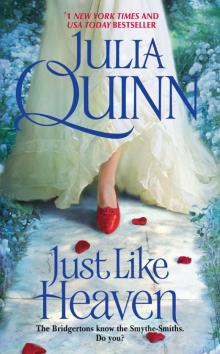 Just Like Heaven
Just Like Heaven B03.2 An Offer from a Gentleman Ep II
B03.2 An Offer from a Gentleman Ep II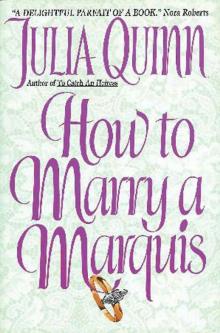 How to Marry a Marquis
How to Marry a Marquis When He Was Wicked: The 2nd Epilogue
When He Was Wicked: The 2nd Epilogue Ten Things I Love About You
Ten Things I Love About You The Viscount Who Loved Me
The Viscount Who Loved Me The Duke and I
The Duke and I B05.2 To Sir Philip With Love Ep II
B05.2 To Sir Philip With Love Ep II An Offer From a Gentleman: The 2nd Epilogue
An Offer From a Gentleman: The 2nd Epilogue Minx
Minx On the Way to the Wedding with 2nd Epilogue
On the Way to the Wedding with 2nd Epilogue Mr. Cavendish, I Presume
Mr. Cavendish, I Presume A Night Like This
A Night Like This Splendid
Splendid Everything and the Moon
Everything and the Moon When He Was Wicked
When He Was Wicked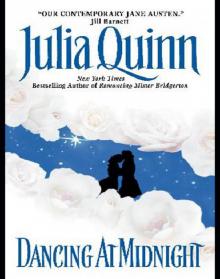 Dancing at Midnight
Dancing at Midnight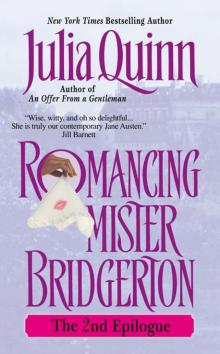 Bridgerton 04: 2nd Epilogue - Romancing Mister Bridgerton
Bridgerton 04: 2nd Epilogue - Romancing Mister Bridgerton The Lost Duke of Wyndham
The Lost Duke of Wyndham To Sir Phillip, With Love
To Sir Phillip, With Love It's in His Kiss
It's in His Kiss The Other Miss Bridgerton
The Other Miss Bridgerton Bridgerton 02: 2nd Epilogue - The Viscount Who Loved Me
Bridgerton 02: 2nd Epilogue - The Viscount Who Loved Me The Secrets of Sir Richard Kenworthy
The Secrets of Sir Richard Kenworthy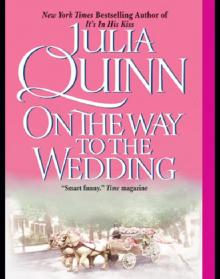 On the Way to the Wedding
On the Way to the Wedding The Secret Diaries of Miss Miranda Cheever
The Secret Diaries of Miss Miranda Cheever Because of Miss Bridgerton
Because of Miss Bridgerton What Happens in London
What Happens in London JQuinn - The Secret Diaries of Miss Miranda Cheever
JQuinn - The Secret Diaries of Miss Miranda Cheever The Girl With the Make-Believe Husband
The Girl With the Make-Believe Husband First Comes Scandal
First Comes Scandal To Catch an Heiress
To Catch an Heiress The Sum of All Kisses
The Sum of All Kisses An Offer From a Gentleman
An Offer From a Gentleman The Bridgertons: Happily Ever After
The Bridgertons: Happily Ever After Bridgerton Collection Volume 1 (Bridgertons)
Bridgerton Collection Volume 1 (Bridgertons)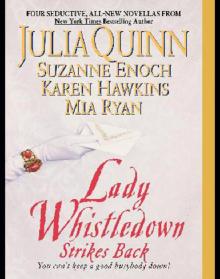 Lady Whistledown Strikes Back
Lady Whistledown Strikes Back Secret Diaries of Miss Miranda Cheever
Secret Diaries of Miss Miranda Cheever An Offer from a Gentleman with 2nd Epilogue
An Offer from a Gentleman with 2nd Epilogue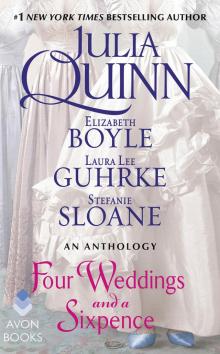 Four Weddings and a Sixpence
Four Weddings and a Sixpence An Offer from a Gentleman: The Epilogue II
An Offer from a Gentleman: The Epilogue II The Further Observations of Lady Whistledown
The Further Observations of Lady Whistledown The Viscount Who Loved Me: The Epilogue II
The Viscount Who Loved Me: The Epilogue II It’s In His Kiss Epilogue II
It’s In His Kiss Epilogue II To Sir Phillip, with Love: The Epilogue II
To Sir Phillip, with Love: The Epilogue II The Secret Diaries of Miss Miranda Cheevers
The Secret Diaries of Miss Miranda Cheevers A Night Like This (Smythe-Smith Quartet)
A Night Like This (Smythe-Smith Quartet)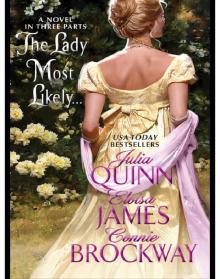 The Lady Most Likely...
The Lady Most Likely... Bridgerton 06: 2nd Epilogue - When He Was Wicked
Bridgerton 06: 2nd Epilogue - When He Was Wicked Just Like Heaven sq-1
Just Like Heaven sq-1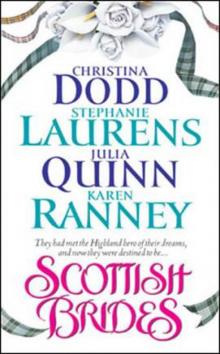 Gretna Greene
Gretna Greene